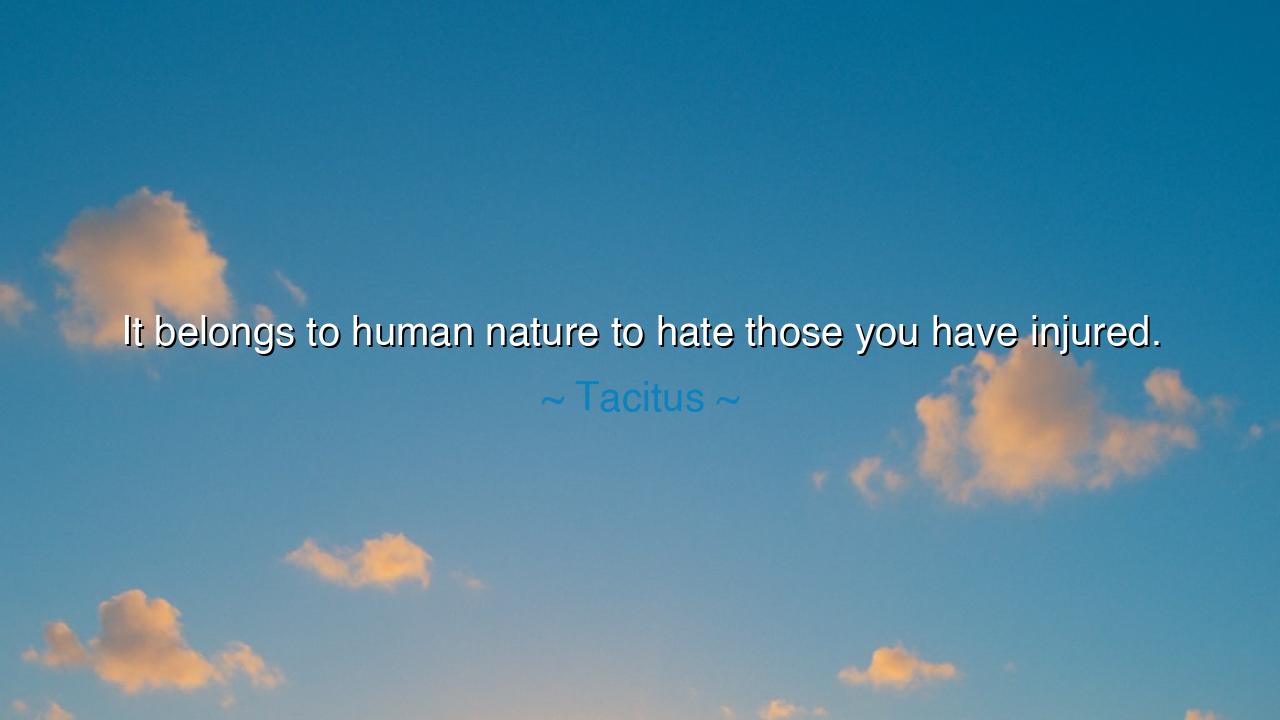
It belongs to human nature to hate those you have injured.






Tacitus, the Roman historian whose words still burn with the fire of truth, once declared: “It belongs to human nature to hate those you have injured.” In this brief but piercing observation, he uncovers a paradox of the soul: when we wrong another, rather than feeling only guilt or remorse, we often turn that wound outward, transforming shame into hatred. It is as though the mind, unable to bear its own guilt, seeks relief by despising the very one it has harmed. Thus, the injured become not only victims of the deed, but also of the contempt born from it.
The origin of this teaching lies in Tacitus’ reflections on the politics and cruelties of imperial Rome. He observed emperors, generals, and senators who, having wronged rivals, did not reconcile with them, but instead grew to hate them more deeply. The reason was clear: the presence of the injured was a living reminder of their own crime. By hating the victim, they could silence their conscience. Tacitus, a keen judge of human nature, exposed this hidden mechanism, showing how wrongdoing does not merely harm the innocent but corrodes the soul of the wrongdoer.
History abounds with examples. Consider the fate of Julius Caesar, struck down by senators who justified their deed as defense of liberty. Yet once the blood was spilled, those same men feared and despised the memory of Caesar even more. Their hatred deepened, not because Caesar had wronged them, but because they themselves had wronged him. Their act required justification, and so they nurtured hatred to cover guilt. Similarly, in modern times, oppressive regimes often vilify those they persecute, branding them enemies or traitors. Why? Because the sight of the oppressed cries out against the oppressor’s conscience, and only hatred can drown that cry.
The emotional power of Tacitus’ words lies in their unmasking of the heart. They remind us that hatred is not always born of another’s offense, but often of our own. We must not forget: it is easier to despise than to admit fault, easier to cast blame than to endure the fire of shame. Thus, the injured may carry not only their wounds, but also the added burden of being hated by those who harmed them. What a tragic circle this becomes—the wrongdoer harms, then hates, and so deepens the injury without end.
Yet within this grim truth lies also a summons to wisdom and courage. For if hatred is often born of guilt, then healing requires the courage to confess, to repent, to bear the weight of one’s own actions without casting it upon the victim. Few are strong enough to do this. Many choose the path of hatred because it is easier. But the nobler path is to confront the self, to accept responsibility, and to seek reconciliation. Only in this way can the cycle of guilt and hatred be broken.
The lesson for us is clear: guard your actions, for every injury done to another is also a wound to your own soul. And if you have wronged, resist the temptation to despise the one you harmed. Instead, turn inward, acknowledge your fault, and seek forgiveness. This is no easy path, but it is the path of the courageous, the path that heals both the victim and the wrongdoer. Hatred conceals guilt, but confession releases it.
Practically, this means cultivating a habit of self-examination. When hatred stirs within you, ask: is it truly the other’s offense, or is it the echo of my own wrongdoing? When you injure another, do not hide behind scorn, but face the pain directly. Apologize. Make amends. Transform the poison of guilt into the medicine of humility. By doing so, you break the ancient cycle that Tacitus so clearly saw, and you rise above the ordinary fate of human nature.
Thus, remember Tacitus’ teaching: “It belongs to human nature to hate those you have injured.” But also remember that you are not bound forever by this nature. You may choose the higher way, the way of courage, confession, and reconciliation. And in that choice lies freedom—for yourself, for those you have harmed, and for the generations who follow after.






AAdministratorAdministrator
Welcome, honored guests. Please leave a comment, we will respond soon